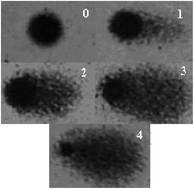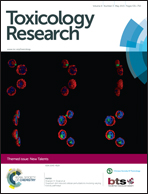Euphorbia tirucalli aqueous extract induces cytotoxicity, genotoxicity and changes in antioxidant gene expression in human leukocytes
Abstract
Euphorbia tirucalli, popularly known as “avelós”, is a toxic plant used as tea in Brazilian folk medicine as an antibacterial, antiviral and anticarcinogenic agent. However, there is no scientific report about its potential toxicity in human cells. Therefore, the objective of the present study was to evaluate the in vitro genotoxicity and cytotoxicity of aqueous extracts of E. tirucalli in human leukocytes using a comet assay and trypan blue exclusion assay, respectively. In addition, the effect of E. tirucalli on the osmotic fragility was investigated in human erythrocytes. The expressions of selected antioxidant mRNA genes (SOD2, CAT and GPx4) as well as tumor protein p53 (TP53) were evaluated by qRT-PCR. Exposure of human leukocytes to high concentrations of aqueous extracts of E. tirucalli (100–150 μg mL−1) caused a significant increase in DNA damage. Leukocyte viability was decreased in the presence of 50–150 μg mL−1E. tirucalli extract. E. tirucalli did not change the osmotic fragility of human erythrocytes. High concentrations of E. tirucalli (10–50 μg mL−1) significantly up-regulated the mRNA of SOD2 and CAT and decreased the mRNA of GPx4 expression in human leukocytes. In addition, the mRNA gene expression of SOD2 was down-regulated at the highest concentration tested (150 μg mL−1). In summary, based on the results of genotoxicity observed in our study, we recommend caution regarding the acute or chronic use of this homemade preparation. Taken together, our results suggest that the aqueous extract of E. tirucalli induces genotoxicity and cytotoxicity in human leukocytes, possibly by interacting with the antioxidant enzyme system, thereby, increasing the formation of ROS and decreasing the cellular tolerance level to chemical constituents of this plant.

- This article is part of the themed collection: New Talents

 Please wait while we load your content...
Please wait while we load your content...